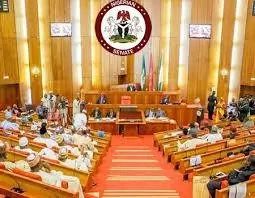…adjourns plenary till January 18, 2022
The Senate on Wednesday passed an aggregate expenditure of N17,126,873,917,692 trillion naira as budget for the 2022 fiscal year.
The passage followed the consideration of a report by the Appropriations Committee on the 2022 Appropriations Bill.
Chairman of the Committee, Senator Barau Jibrin, said the revenue projection for the 2022 budget was predicated on the Medium Term Expenditure Framework/Fiscal Strategy Paper approved by the National Assembly.
Barau recalled that the National Assembly had approved 1.88mbpd Daily Oil Production and US$62 as against $US57 proposed by the executive arm of government.
He explained that the increase in oil price Benchmark from US$57 to US$62 was done to reflect the current market value in the international market.
He added that the exchange rate was pegged at N410.15/US$1, Gross Domestic Product (GDP) Rate at 4.2 and Inflation Rate at 13 percent.
The lawmaker explained that out of the N17,126,873,917,692 passed, N869,667,187,542 is for Statutory Transfer; N6,909,849,788,737 is for Recurrent Expenditure; N5,467,403,959,863 is for Capital Expenditure; and N3,879,952,981,550 is for Debt Service.
The Committee in its recommendations stated that additional revenues discovered should be provided to the Works and Housing Ministry for funding of critical projects, Independent National Electoral Commission (INEC), for the 2023 General Elections, Defence and the National Population Commission for the 2022 Population Census.
It added also that N98 billion naira increase in deficit should be approved to take care of some of the additional requests from the executive arm of government.
A breakdown of recurrent expenditure shows that N61,079,757,342 was budgeted for the Presidency in 2022, N996,09 1,292,618 for Defence, N79,243,483,198 for the Ministry of Foreign Affairs, N55,796,274,038 for Federal Ministry of Information and Culture, N257,626,461,524 for Ministry of Interior, N7,919,353,247 for Office of the Head of Civil Service of the Federation, and N4,476,854,068 for the Auditor General for the Federation.
While the Federal Ministry of Police Affairs received N518,532,292,470, the Ministry of a communications and Digital Economy got N23,387,996,618, National Security Adviser – N155,820,2 14,009, Infrastructure Concession Regulatory Commission – N1,344,674,257, Secretary to the Government of the Federation – N62,575,420,244, Federal Ministry of Special Duties and Inter-Governmental Affairs – N4,439,614,685, Federal Ministry of Agriculture and Rural Development – N75,544,228,649, and Federal Ministry of Finance, Budget and National Planning – N28,604, 104,969.
In addition, the Federal Ministry of Industry, Trade and Investment received N17,966,745,438, Federal Ministry of Labour and Employment – N14,453,726,978, Federal Ministry of Science, Technology and Innovation – N49,683,523,165, Federal Ministry of Transport – N15,892,132,819, Federal Ministry of Aviation – N7,692,548,460, Federal Ministry of Power – N6,262,156,943, and Ministry of Petroleum Resources – N30,502,257, 191.
Also, N12,038,392,758 was budgeted for the Ministry of Mines and Steel Development, N31,935,604,197 for Federal Ministry of Works and Housing, N870,534,226 for National Salaries, Incomes and Wages Commission, N456,245,928 for Fiscal Responsibility Commission, N10,669,058,320 for Federal Ministry of Water Resources, N26,761,780,448 for Federal Ministry of Justice, and N11,655,253,717 for the Independent Corrupt Practices and Related Offences Commission.
Others are Federal Capital Territory Administration – Nil, Federal Ministry of Niger Delta – N2,569,680,304, Federal Ministry of Youth and Sports Development – N185,489,102,966, Federal Ministry of Women Affairs – N2,103,758,084, Federal Ministry of Education – N593,473,925,256, Federal Ministry of Health – N462,858,698,619, Federal Ministry of Environment – N22,796,647,842, National Population Commission – N8,880,618,082, and Ministry of Humanitarian Affairs, Disaster Management and Social Development – N7,669,972,542.
Other Executive bodies such as the Federal Code of Conduct Bureau received N2,343,845,401, Code of Conduct Tribunal – N830,910,644, Federal Character Commission – N3,272,871,999, Federal Civil Service Commission – N1,217,473,478, Police Service Commission – N926,505,919, and Revenue Mobilization, Allocation, and Fiscal Commission – N2,337,230,632.
The Senate, after passing the 2022 budget, adjourned plenary till January 18, 2022 for the Christmas break.

